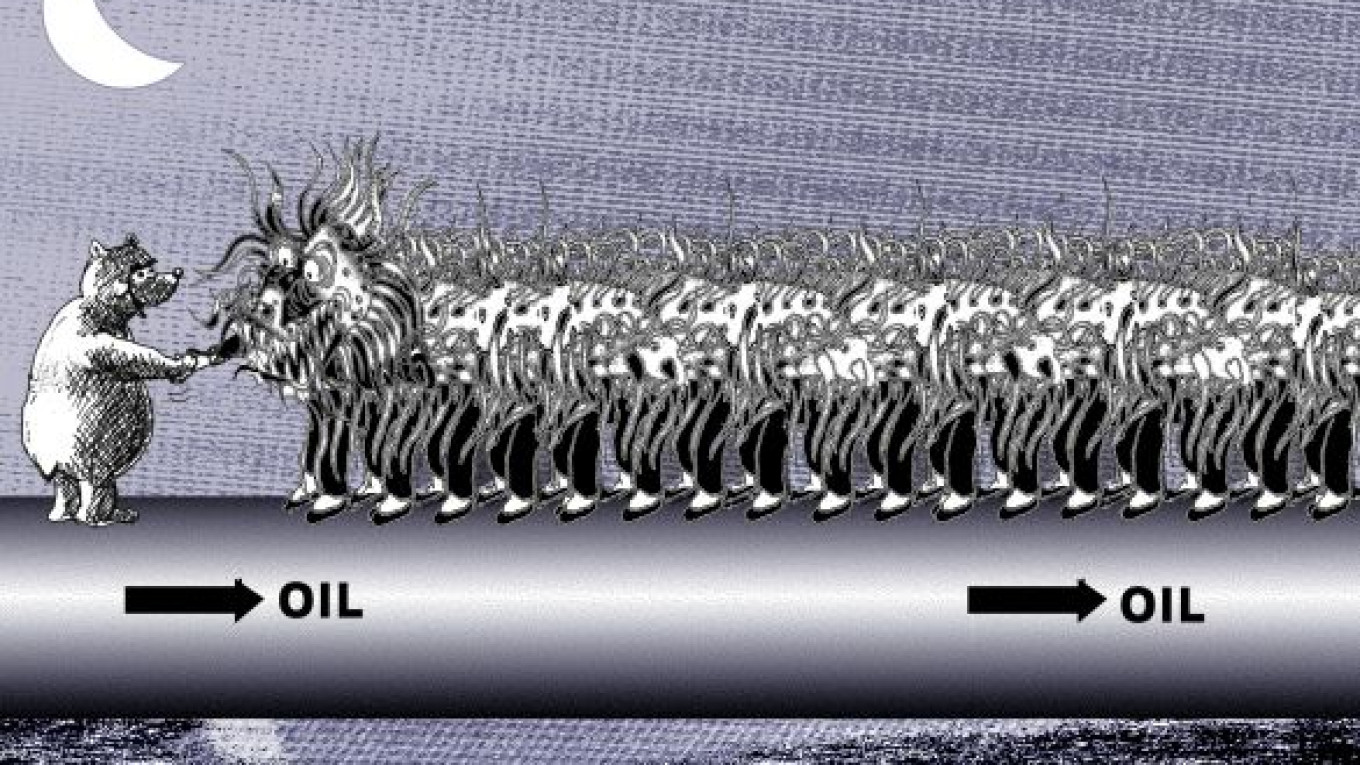Whenever high-level talks are held between Russia and China, it seems the media always says? Moscow's foreign policy is focusing on the East. There is some basis for that, but it is also becoming increasingly evident that Russia is taking on the role as China's junior partner.
Moscow was undoubtedly pleased by the fact that newly elected Chinese President Xi Jinping chose Russia for his first official visit abroad, which both sides used to issue statements of friendship and strategic partnership. In contrast to Europe and the U.S., China does not give them condescending lectures about human rights abuses. The Chinese are masters of diplomatic etiquette and long ago learned to achieve their goals through skillful means, never seeking to deliberately humiliate their partner. In response to the pleasant-sounding talk of friendship, partnership, equal relations and respect, Russia makes concessions to China that it less frequently agrees to with the West.
Thanks largely to energy shipments, trade volume between Russia and China is constantly growing and reached a total of $88 billion in 2012. The main agreements that Xi signed during his recent visit to Moscow centered on energy shipments to China. Gazprom chief Alexei Miller said Chinese credit will fund construction of a branch line of a Siberian pipeline. According to Miller, gas deliveries to China would begin in 2018. The contract is scheduled to be signed in July even though an agreement has not yet been reached on the gas price. China wants to pay far less than European buyers for gas, but it seems that Russia, which is tired of the constant haggling of European buyers, might be willing to make concessions to China. After all, Moscow already supplies electricity to China at lower rates than it charges Russian consumers at home.
Russia also plans to increase oil deliveries to China. With Rosneft taking the lead, Russia will increase oil shipments to China from the current 15 million tons to 31 million tons within 20 years. Rosneft will use Chinese credit to increase output to meet the demand. The Chinese plan to build an oil refinery in Tianjin capable of refining 13 million tons of crude per year, 9 million tons of which will be supplied by Russia. This makes sense since Russia has all but stopped building new refineries, and its existing refineries produce an extremely low grade of oil.
Russia will also be selling coal to China, although China will be mining much of it on Russian territory. Just like China does in Africa, it will build access roads and power plants in Russia to support the coal-mining operations.
There is one more important factor that plays an important role in Russia-Chinese relations: Russian oil accounts for only 8 percent of Chinese consumption, and Russian coal represents an even smaller share. As a result, since Beijing can easily find other energy suppliers, China is in a strong position to dictate, or at the very least influence, terms to Russia in future negotiations.
Not long ago, Russia was a major supplier of equipment, weapons and technology to China. Today, the situation has changed dramatically — and not to Russia's advantage. Only 10 years ago, industrial goods and equipment accounted for 30 percent of Russia's trade with China. Now they represent less than 1.5 percent. Russia now buys Chinese metalworking machinery, something that only a few years ago would have been considered absurd. Only a short time ago, Russia was one of China's main weapons suppliers. Now China has practically no need of Russian arms, having copied whatever much of what it needs. The weapons that China has purchased from Russia could be used in a air war with Taiwan but not in a massive land-based operation against Russia. For example, China purchased only a small quantity of Su-27 fighter aircraft, and half of those were the training model. This small quantity is insufficient to equip the enormous Chinese army, but enough to train the flight crews of its air force. But not long ago, China rejected an offer to produce the Su-27 under license from Russia and instead began production of its own J-11B aircraft that draws on the Su-27 as well as on technology borrowed from the MiG and Israeli aircraft. ?
Amazingly, Moscow doesn't seem to have a problem with this rather strange, one-sided model of Russian-Chinese relations. Kremlin leaders seemingly pretend that the bilateral relations are equal and based on mutual respect and that China is actually prepared to team up with Russia to present a unified front against the U.S. If so, they have allowed themselves to be fooled: China will never allow itself to be used in foreign relations ploys — except the ones that it has designed itself.
Georgy Bovt is a political analyst.
Related articles:
A Message from The Moscow Times:
Dear readers,
We are facing unprecedented challenges. Russia's Prosecutor General's Office has designated The Moscow Times as an "undesirable" organization, criminalizing our work and putting our staff at risk of prosecution. This follows our earlier unjust labeling as a "foreign agent."
These actions are direct attempts to silence independent journalism in Russia. The authorities claim our work "discredits the decisions of the Russian leadership." We see things differently: we strive to provide accurate, unbiased reporting on Russia.
We, the journalists of The Moscow Times, refuse to be silenced. But to continue our work, we need your help.
Your support, no matter how small, makes a world of difference. If you can, please support us monthly starting from just $2. It's quick to set up, and every contribution makes a significant impact.
By supporting The Moscow Times, you're defending open, independent journalism in the face of repression. Thank you for standing with us.
Remind me later.


